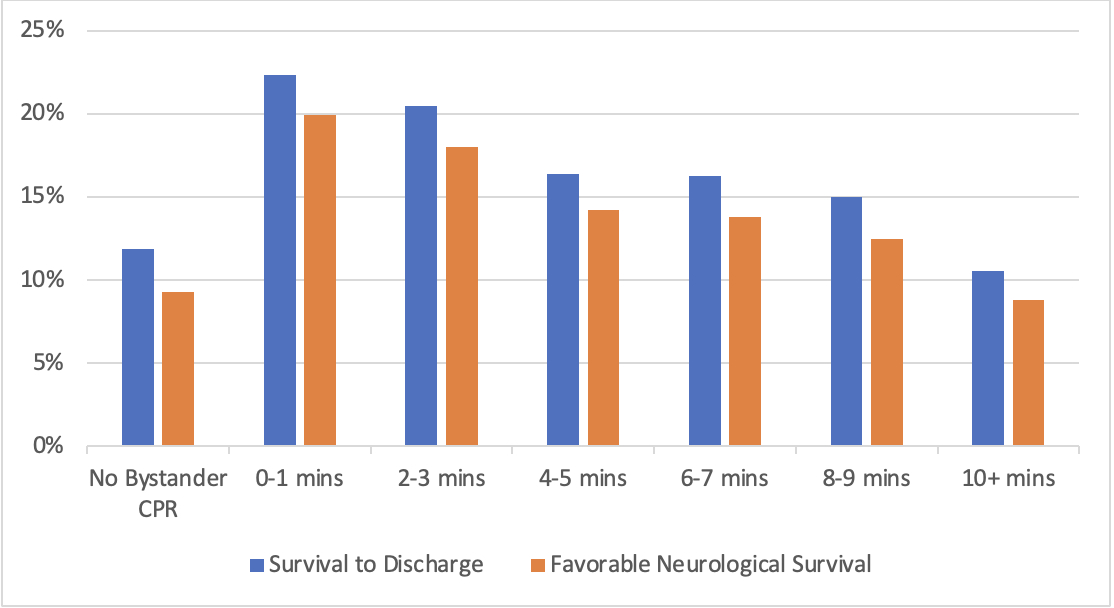Final ID: Or104
At What Time Point is Delay to First Bystander Cardiopulmonary Resuscitation Not Associated with Survival for Out-of-Hospital Cardiac Arrest?
Abstract Body: Background
Bystander cardiopulmonary resuscitation (CPR) is a critical link in the chain of survival for out-of-hospital cardiac arrest (OHCA).
Hypothesis
Although bystander CPR improves survival for OHCA, there may be a time threshold beyond which bystander CPR may no longer be associated with improved OHCA survival.
Aims
To determine the time interval for when initiation of bystander CPR may no longer be associated with OHCA survival.
Methods
Within the Cardiac Arrest Registry to Enhance Survival, we identified 198,869 witnessed OHCAs during 2013-2022. Time to initiation of bystander CPR was categorized in 2-minute intervals (0-1, 2-3, 4-5, 6-7, 8-9, 10+ minutes). We used multivariable hierarchical logistic regression to evaluate the association between each time interval for initiation of bystander CPR, as compared with no bystander CPR, for survival to discharge and favorable neurological survival.
Results
Mean age was 64.3±15.9 years and 68,085 (34.2%) were women. For those that did not receive bystander CPR, 11.9% survived to discharge and 9.3% had favorable neurological survival (Figure). Individuals receiving CPR within 2 minutes of OHCA had relatively higher rates of survival to discharge (OR: 1.85 [95% CI: 1.79-1.92; p<0.001]) and favorable neurological survival (OR: 1.99 [95% CI: 1.92-2.07; p<0.001]). The survival benefit of bystander CPR, as compared with no bystander CPR, decreased with each subsequent time interval and was no longer associated with improved survival when bystander CPR was initiated 10 or more minutes after the onset of OHCA (Table).
Conclusions
Bystander CPR is critical for enhancing survival in OHCA. Under 10 minutes of OHCA, there was a graded inverse relationship between time to bystander CPR and survival outcomes. After 10 minutes there was no longer an association for bystander CPR, underscoring the importance of improving the timeliness of this intervention to improve overall OHCA survival.
Bystander cardiopulmonary resuscitation (CPR) is a critical link in the chain of survival for out-of-hospital cardiac arrest (OHCA).
Hypothesis
Although bystander CPR improves survival for OHCA, there may be a time threshold beyond which bystander CPR may no longer be associated with improved OHCA survival.
Aims
To determine the time interval for when initiation of bystander CPR may no longer be associated with OHCA survival.
Methods
Within the Cardiac Arrest Registry to Enhance Survival, we identified 198,869 witnessed OHCAs during 2013-2022. Time to initiation of bystander CPR was categorized in 2-minute intervals (0-1, 2-3, 4-5, 6-7, 8-9, 10+ minutes). We used multivariable hierarchical logistic regression to evaluate the association between each time interval for initiation of bystander CPR, as compared with no bystander CPR, for survival to discharge and favorable neurological survival.
Results
Mean age was 64.3±15.9 years and 68,085 (34.2%) were women. For those that did not receive bystander CPR, 11.9% survived to discharge and 9.3% had favorable neurological survival (Figure). Individuals receiving CPR within 2 minutes of OHCA had relatively higher rates of survival to discharge (OR: 1.85 [95% CI: 1.79-1.92; p<0.001]) and favorable neurological survival (OR: 1.99 [95% CI: 1.92-2.07; p<0.001]). The survival benefit of bystander CPR, as compared with no bystander CPR, decreased with each subsequent time interval and was no longer associated with improved survival when bystander CPR was initiated 10 or more minutes after the onset of OHCA (Table).
Conclusions
Bystander CPR is critical for enhancing survival in OHCA. Under 10 minutes of OHCA, there was a graded inverse relationship between time to bystander CPR and survival outcomes. After 10 minutes there was no longer an association for bystander CPR, underscoring the importance of improving the timeliness of this intervention to improve overall OHCA survival.
More abstracts on this topic:
A Multicentre Study for Hands Only CPR (HOCPR) training assessment towards building a ‘Nation of Life Savers” in India
Ravikumar Thanjavur, Sarma Kvs, Ravikumar Thanjavur, Sarkar Manuj, Debnath Dhrubajyoti, Behera Priyamadhaba, Ghate Jayshri, Trikha Divay, Samantaray A, Madhavi K
A Porcine Model of Cardiac Arrest Without Pre-Arrest Fluid Loading, Sternal Molding, or EpinephrineParadis Aidan, Paradis Norman, Gaddy David, Moodie Karen, Mader Timothy, Dufresne Alexandre, Couturier Christine, Dufresne Simon, Davis Daniel, Sims Christopher


